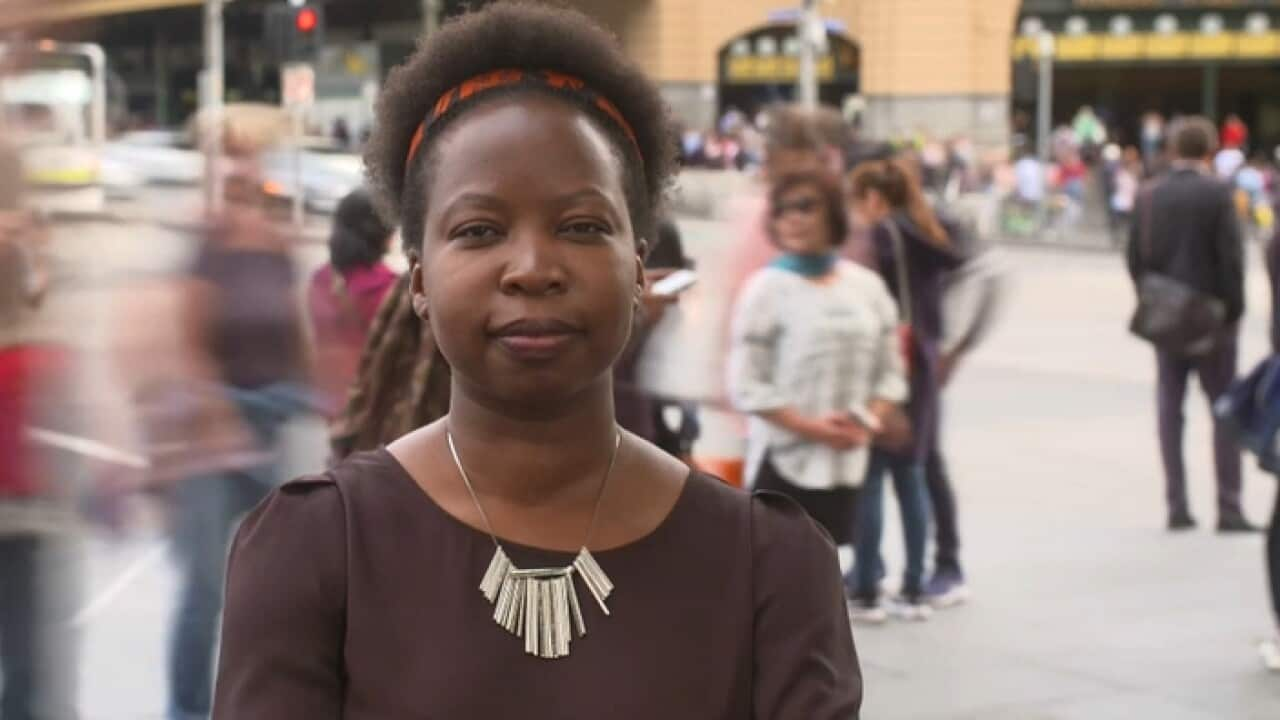SBS Italian news, with a slower pace. This is Slow Italian, Fast Learning, the very best of the week’s news, read at a slower pace, with Italian and English text available.
Italian
In Gran Bretagna, il primo ministro Theresa May ha recentemente proposto che le aziende debbano rendere pubbliche le disparità retributive tra lavoratori locali e di origine straniera.
La proposta è giunta a seguito di una serie di studi che hanno rilevato un significativo divario retributivo tra lavoratori di diversa estrazione etnica.
Succede la stessa cosa in Australia?
E, in tal caso, che cosa si sta facendo per combattere il fenomeno?
La Senior Analyst Mayase Jere sa cosa vuol dire non essere considerati per una promozione.
Trentasette anni, residente a Melbourne ma originaria dello Zimbabwe, si chiede se la cosa sarebbe stata diversa se avesse avuto origini anglo-americane.
"I think, for a while there, I actually thought maybe it's mainly because of my personality, that I'm not aggressive enough. But when you start hearing stories of other women of colour experiencing the same, of not progressing as quickly or their salaries being disproportionate to their peers, then you start to realise, 'Actually, I'm not going crazy. This is not just me. Other people are experiencing the same thing.'"
Mentre si è lentamente diffusa la consapevolezza di un divario retributivo tra i generi nelle aziende e nella comunità australiana, la questione di un divario retributivo tra persone di diversa etnia non lo è.
In Inghilterra invece, i datori di lavoro potrebbero essere presto costretti a pubblicare statistiche sul divario retributivo etnico dopo che una serie di inchieste governative ha rilevato una netta distinzione nei salari tra lavoratori etnici e non-etnici.
In un dipartimento governativo, questa differenza è risultata addirittura del 37%.
La premier britannica Theresa May ha proposto all'inizio di questo mese che i datori di lavoro pubblichino le statistiche interne sul divario retributivo etnico.
Nel paese le aziende con 250 o più dipendenti sono già costrette a pubblicare i loro dati relativi al divario di retribuzione per genere.
Non ci sono dati esaustivi sull'esistenza di un gap retributivo etnico in Australia, ma la fondatrice di Culturally Diverse Women, Div Pillay, ha dichiarato che esistono prove aneddotiche e indagini su circa 150 donne di diversa provenienza culturale impiegatein diversi settori che fanno temere che il divario possa essere simile o addirittura maggiore rispetto alla Gran Bretagna.
"They often under-negotiate at the start, and that trails them through all the way to that 10-year mark. So what we find is that, after 10 years, from a culturally diverse woman perspective versus an Anglo-Celtic woman perspective born here in Australia, there is a significant difference, and we estimate that difference to be about five to eight years in a lag. And that's significant. It's significant for economic reasons, from a super-fund perspective, from a financial-growth perspective, and what we're finding is that, potentially, culturally diverse women will have to work longer in their careers to manage their financial stability."
Il nuovo commissario contro la discriminazione razziale , Chin Tan, ha rifiutato di rilasciare un commento alla SBS sulla questione del divario retributivo etnico, così come la ministra per l'occupazione e le donne Kelly O'Dwyer e il ministro degli affari multiculturali David Coleman.
La deputata laburista Anne Aly, nata in Egitto prima di emigrare in Australia all'età di due anni, afferma che la raccolta dei dati sarebbe un primo passo importante.
"I think data collection is one of the first and most important things that we can do. Mandatory reporting, or some form of reporting on the number of people employed, and the level that they're employed at, and potentially even the pay gap, I think, is important."
Ma la Deputata Aly sostiene anche che fatti recenti come l'introduzione della mozione "It's ok to be white" al Senato dimostrano che l'Australia ha ancora una lunga strada da percorrere nelle questioni riguardanti la disuguaglianza.
English
In Britain, Prime Minister Theresa May recently proposed making companies publish their pay disparity between ethnic and Anglo workers.
It came after a series of audit reports found a significant pay gap between workers of different ethnic backgrounds.
Does the same thing happen in Australia? And, if so, what is being done to combat it?
Senior business analyst Mayase Jere knows what it is like to be overlooked for a promotion.
But the Melbourne-based 34-year-old, of Zimbabwean heritage, says she wonders whether it would have been different if she were of Anglo background.
"I think, for a while there, I actually thought maybe it's mainly because of my personality, that I'm not aggressive enough. But when you start hearing stories of other women of colour experiencing the same, of not progressing as quickly or their salaries being disproportionate to their peers, then you start to realise, 'Actually, I'm not going crazy. This is not just me. Other people are experiencing the same thing.'"
While the reality of a pay gap between genders has slowly become acknowledged in business and the wider community of Australia, the question of a pay gap between people of different ethnic backgrounds has not.
But employers in Britain could soon be forced to publish statistics on their ethnic pay gap after a series of government audits found a stark divide in the pay packets of ethnic and non-ethnic workers.
In one government department, the difference was found to be as wide as 37 per cent.
British prime minister Theresa May proposed earlier this month making employers publish their ethnic pay-gap statistics.
Companies in the country with 250 or more employees are already forced to publish their pay-gap statistics for gender.
There is no comprehensive data on an ethnic pay gap in Australia.
But Culturally Diverse Women founder Div Pillay says anecdotal evidence and surveys of around 150 multicultural female workers from a range of industries make her fear the gap may be similar or even larger than in Britain.
"They often under-negotiate at the start, and that trails them through all the way to that 10-year mark. So what we find is that, after 10 years, from a culturally diverse woman perspective versus an Anglo-Celtic woman perspective born here in Australia, there is a significant difference, and we estimate that difference to be about five to eight years in a lag. And that's significant. It's significant for economic reasons, from a super-fund perspective, from a financial-growth perspective, and what we're finding is that, potentially, culturally diverse women will have to work longer in their careers to manage their financial stability."
Australia's new race commissioner, Chin Tan, has declined to comment to SBS about the ethnic pay gap, as have Employment and Women Minister Kelly O'Dwyer and Multicultural Affairs Minister David Coleman.
Labor MP Anne Aly born in Egypt before migrating to Australia at the age of two, says data collection would be an important first step.
"I think data collection is one of the first and most important things that we can do. Mandatory reporting, or some form of reporting on the number of people employed, and the level that they're employed at, and potentially even the pay gap, I think, is important."))
But Anne Aly says recent events such as the near-passage of the "It's okay to be white" motion in the Senate show Australia still has a long way to go in its discussions around structural inequality.
Report by Jarni Blakkarly




